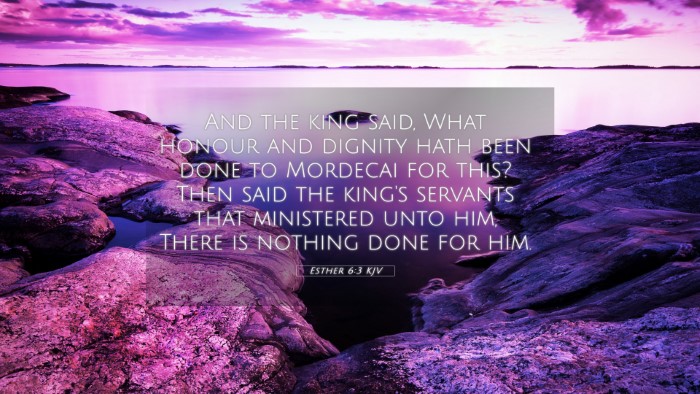Old Testament
Genesis Exodus Leviticus Numbers Deuteronomy Joshua Judges Ruth 1 Samuel 2 Samuel 1 Kings 2 Kings 1 Chronicles 2 Chronicles Ezra Nehemiah Esther Job Psalms Proverbs Ecclesiastes Song of Solomon Isaiah Jeremiah Lamentations Ezekiel Daniel Hosea Joel Amos Obadiah Jonah Micah Nahum Habakkuk Zephaniah Haggai Zechariah MalachiEsther 6:3 Similar Verses
Esther 6:3 Cross References
And the king said, What honour and dignity hath been done to Mordecai for this? Then said the king's servants that ministered unto him, There is nothing done for him.
Uncover the Rich Themes and Topics of This Bible Verse
Listed below are the Bible themes associated with Esther 6:3. We invite you to explore each theme to gain deeper insights into the Scriptures.
Esther 6:3 Cross Reference Verses
This section features a detailed cross-reference designed to enrich your understanding of the Scriptures. Below, you will find carefully selected verses that echo the themes and teachings related to Esther 6:3 KJV. Click on any image to explore detailed analyses of related Bible verses and uncover deeper theological insights.
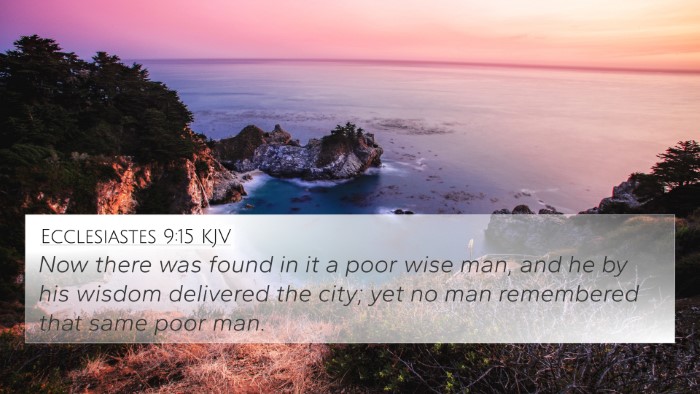
Ecclesiastes 9:15 (KJV) »
Now there was found in it a poor wise man, and he by his wisdom delivered the city; yet no man remembered that same poor man.
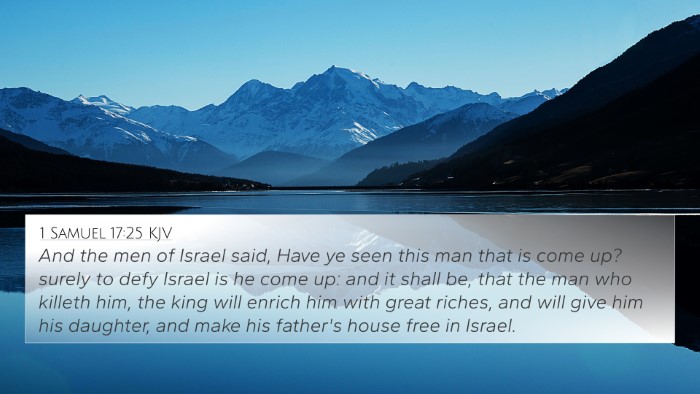
1 Samuel 17:25 (KJV) »
And the men of Israel said, Have ye seen this man that is come up? surely to defy Israel is he come up: and it shall be, that the man who killeth him, the king will enrich him with great riches, and will give him his daughter, and make his father's house free in Israel.

1 Chronicles 11:6 (KJV) »
And David said, Whosoever smiteth the Jebusites first shall be chief and captain. So Joab the son of Zeruiah went first up, and was chief.

Judges 1:12 (KJV) »
And Caleb said, He that smiteth Kirjathsepher, and taketh it, to him will I give Achsah my daughter to wife.
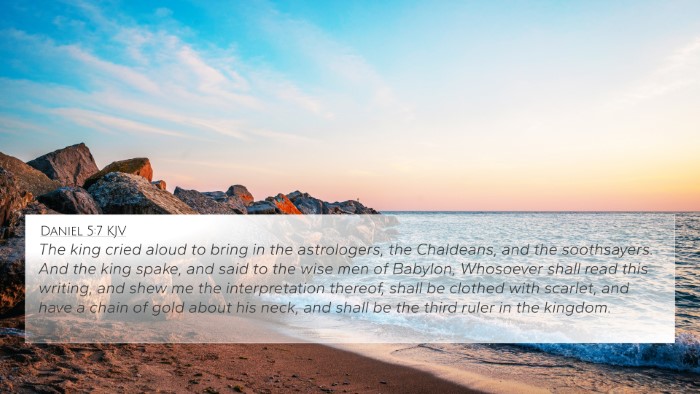
Daniel 5:7 (KJV) »
The king cried aloud to bring in the astrologers, the Chaldeans, and the soothsayers. And the king spake, and said to the wise men of Babylon, Whosoever shall read this writing, and shew me the interpretation thereof, shall be clothed with scarlet, and have a chain of gold about his neck, and shall be the third ruler in the kingdom.

Daniel 5:29 (KJV) »
Then commanded Belshazzar, and they clothed Daniel with scarlet, and put a chain of gold about his neck, and made a proclamation concerning him, that he should be the third ruler in the kingdom.

Daniel 5:16 (KJV) »
And I have heard of thee, that thou canst make interpretations, and dissolve doubts: now if thou canst read the writing, and make known to me the interpretation thereof, thou shalt be clothed with scarlet, and have a chain of gold about thy neck, and shalt be the third ruler in the kingdom.
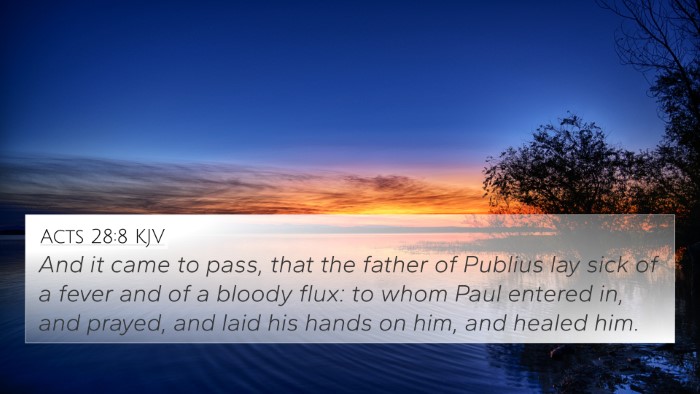
Acts 28:8 (KJV) »
And it came to pass, that the father of Publius lay sick of a fever and of a bloody flux: to whom Paul entered in, and prayed, and laid his hands on him, and healed him.
Esther 6:3 Verse Analysis and Similar Verses
Understanding Esther 6:3
Esther 6:3 reads: "And the king said, What honor and dignity hath been done to Mordecai for this? Then said the king's servants that ministered unto him, There is nothing done for him."
Overview
This verse captures a pivotal moment in the narrative of Esther, highlighting the themes of recognition, justice, and divine providence. King Ahasuerus is reflecting on Mordecai’s earlier deed of saving his life, yet no honor has been bestowed upon him, which sets the stage for the unfolding events.
Commentary Insights
Insights from well-known public domain commentaries provide a broader understanding of this verse:
- Matthew Henry: Henry suggests that this inquiry by the king demonstrates God’s hand in the affairs of men. The delay in honoring Mordecai reveals a divine timing that prepares for the subsequent reversals and triumphs in the story.
- Albert Barnes: Barnes highlights the importance of the king's curiosity about Mordecai. This signifies that God can stir the hearts of kings, leading them to acts that fulfill His purposes. Mordecai’s anonymity in the honor he deserves is significant, as it builds the tension in the narrative.
- Adam Clarke: Clarke points out that the question posed by Ahasuerus serves as a moment of reflection on justice and reward. He notes that this lack of recognition is an element of irony, crucial for revealing the deeper truth of the situation.
Thematic Connections
Esther 6:3 can be linked with several broader Biblical themes and verses, showcasing scriptural cross-references and the interconnectedness of Biblical texts:
Cross-References
- Esther 2:21-23: This earlier passage recounts Mordecai's act of loyalty in uncovering a plot against the king, setting the stage for this inquiry.
- Psalms 37:6: “And He shall bring forth thy righteousness as the light, and thy judgment as the noonday.” This speaks to the divine justice that Mordecai will ultimately receive.
- Proverbs 16:7: “When a man's ways please the LORD, he maketh even his enemies to be at peace with him.” This supports the notion that God intervenes on behalf of the faithful.
- Matthew 5:16: Jesus teaches, “Let your light so shine before men, that they may see your good works, and glorify your Father which is in heaven,” paralleling Mordecai’s unrecognized good deeds.
- Galatians 6:7: “Be not deceived; God is not mocked: for whatsoever a man soweth, that shall he also reap.” This relates to the delayed reward for Mordecai’s righteousness.
- Romans 8:28: “And we know that all things work together for good to them that love God,” emphasizing the overarching theme of divine providence in the narrative.
- 1 Peter 5:6: “Humble yourselves therefore under the mighty hand of God, that he may exalt you in due time,” reinforcing the message that God’s recognition comes in His perfect timing.
Inter-Biblical Dialogue
Esther 6:3 exemplifies the connections between Old and New Testament themes. It serves as a rich ground for a comparative Bible verse analysis and thematic study:
- Recognizing acts of service and loyalty remains pivotal throughout scriptures, enhancing our understanding of the significance of humility and service.
- The inquiry of the king aligns with God’s broader narrative of justice and recognition, encouraging believers to reflect on their own actions.
- The events surrounding this verse illustrate divine orchestration, linking to New Testament teachings about God’s providence and the importance of trusting in His timing.
Tools for Cross-Referencing
To delve deeper into the themes and connections found in Esther 6:3, various tools for Bible cross-referencing can be utilized:
- Bible Concordance: Search for keywords within Esther and related scriptures.
- Bible Cross-Reference Guide: Utilize guides to identify thematic connections across both Testaments.
- Cross-Reference Bible Study: Engage in a thorough study that connects and compares related verses.
- Bible Reference Resources: Access commentaries and reference texts that provide insight into cross-references.
Conclusion
In studying Esther 6:3, believers gain insight into the intersections of justice, divine timing, and fulfillment in God's plan. Cross-referencing related passages deepens the understanding of how individual acts of loyalty and service are recognized in God's perfect timing. The themes explored not only elucidate this specific narrative but also provide a broader framework for interpreting Scripture as a cohesive text of divine will and purpose.

